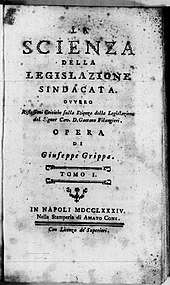Gaetano Filangieri
Gaetano Filangieri (22 August 1753 – 21 July 1788) was an Italian jurist and philosopher.

Filangieri was born in San Sebastiano al Vesuvio, in the province of Naples, Italy in noble family of Filangieri. His father, Caesar, prince of Arianiello, intended him for a military career, which he commenced at the early age of seven, but soon abandoned for the study of the law. At the bar his knowledge and eloquence early secured his success, while his defence of a royal decree reforming abuses in the administration of justice gained him the favor of the king, Ferdinand IV of Naples, and his prime minister Bernardo Tanucci, and led to several honorable appointments at court.
The first two books of his great work, La Scienza della legislazione, appeared in 1780. The first book contained an exposition of the rules on which legislation in general ought to proceed, while the second was devoted to economic questions. These two books showed him an ardent reformer, and vehement in denouncing the abuses of his time. He insisted on unlimited free trade, and the abolition of the mediaeval institutions which impeded production and national well-being. Its success was great and immediate not only in Italy, but throughout Europe at large.
In 1783 he married, resigned his appointments at court, and retiring to Cava, devoted himself steadily to the completion of his work. In the same year appeared the third book, relating entirely to the principles of criminal jurisprudence. The suggestion which he made in it as to the need for reform in the Roman Catholic church brought upon him the censure of the ecclesiastical authorities, and it was condemned by the congregation of the Index in 1784. In 1785 he published three additional volumes, making the fourth book of the projected work, and dealing with education and morals.
In 1787 he was appointed a member of the supreme treasury council by Ferdinand I of the Two Sicilies, but his health, impaired by close study and over-work in his new office, compelled his withdrawal to the country at Vico Equense. He died somewhat suddenly of tuberculosis on 21 July 1788, having just completed the first part of the fifth book of his Scienza. He left an outline of the remainder of the work, which was to have been completed in six books.
La Scienza della legislazione has gone through many editions and translations.[1] The best Italian edition is in 8 vols. 8vo. (1807). The Milan edition (1822) contains the Opusculi scelti and a life by Donato Tommasi. A French translation appeared in Paris in 7 vols. 8vo (1786–1798); it was republished in 1822-1824, with the addition of the Opuscies and notes by Benjamin Constant.
According to the Gaetano Filangieri Philosophical Society, one of Filangieri's ardent admirers was Benjamin Franklin, and the two corresponded from 1780 until Filangieri's death in 1788.
Carlo Filangieri, the soldier and statesman, was his son, and Gaetano Filangieri, prince of Satriano was his grandson.
Bibliography

- Riflessioni politiche su l'ultima legge del sovrano, che riguarda la riforma dell'amministrazione della giustizia, Naples 1774
- La scienza della legislazione, Naples, 1780-1785
- Reflexiones sobre la libertad del comercio de frutos, Madrid 1784
- Chiesa e convento di S. Lorenzo maggiore in Napoli : descrizione storica ed artistica, Naples, 1833 (about San Lorenzo Maggiore
- L' arte del geometra agrimensore o sia trattato di geometria pratica' - note, Naples, 1841
- Il Museo artistico industriale in Napoli: relazione di Gaetano Filangieri, Naples, 1879
- Di alcuni dipinti a fresco in S. Pietro a Maiella scoverti per cura di Gaetano Filangieri principe di Satriano, Naples, 1881
- La testa del cavallo in bronzo già di casa Maddaloni in via Sedile di Nido, ora al Museo Nazionale di Napoli: ricerche di Gaetano Filangieri, Naples 1882
- Chiesa e convento del Carmine Maggiore in Napoli: descrizione storica ed artistica per Gaetano Filangieri, Napoli 1885
- La famiglia, le case e le vicende di Lucrezia D'Alagno: documenti per Gaetano Filangieri, Naples. 1886
- Catalogo del Museo Civico Gaetano Filangieri principe di Satriano; a cura di B. Capasso, E. Cerillo; con note di G. Filangieri, Napoli 1888
- Chiesa e monastero di San Gaudioso in Napoli per Gaetano Filangieri, Naples 1888
- Descrizione storica ed artistica della chiesa e convento di Santa Maria delle Grazie Maggiore a Caponapoli per Gaetano Filangieri, Naples 1888
- Per la morte di Gaetano Del Pezzo marchese di Campodisola, Naples 1889
- Proposte al real governo per la istituzione di addetti industriali e commerciali presso i consolati d'Italia all'estero per Gaetano Filangieri, Napoli 1889
- Indice degli artefici delle arti maggiori e minori la più parte ignoti o poco noti ai napoletani e siciliani si delle altre regioni d'Italia o stranieri che operarono tra noi con notizia delle loro opere e del tempo del loro esercizio da studii e nuovi documenti raccolti e pubblicati per cura di Gaetano Filangieri, Napoli
- Il mondo nuovo e le virtu civili: l'epistolario di Gaetano Filangieri 1772-1788, Napoli 1999
- Bernardo Cozzolino, San Sebastiano al Vesuvio: Un itinerario storico artistico e un ricordo di Gaetano Filangieri, Edizioni Poseidon, Napoli 2006;
- F.S. Salfi, Franco Crispini (ed.), "Introduzione" di Valentina Zaffino, Elogio di Filangieri, Cosenza, Pellegrini, 2012, ISBN 978-88-8101-863-5
Notes
- Filangieri, Gaetano (1806). Translated by Sir Richard Clayton (ed.). The science of legislation. London: Thomas Ostell, London, by Emery and Adams, Bristol.
Filangieri.
External links
- Biography (in Italian)
